Corinthians A Community in Conflict
Charlene Heydinger
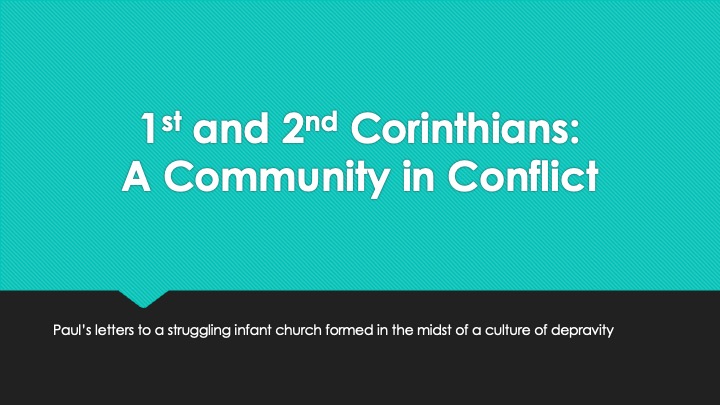
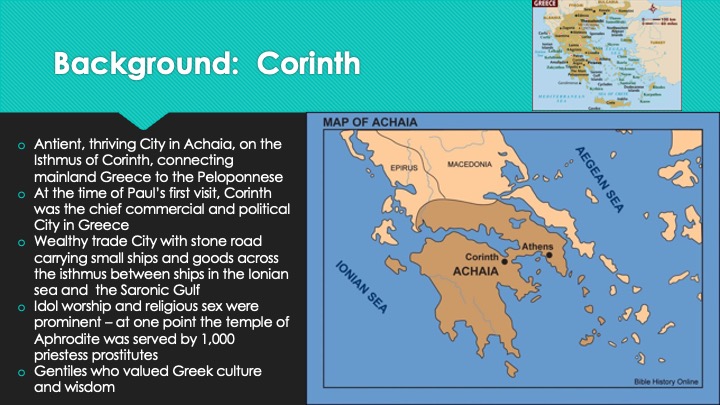
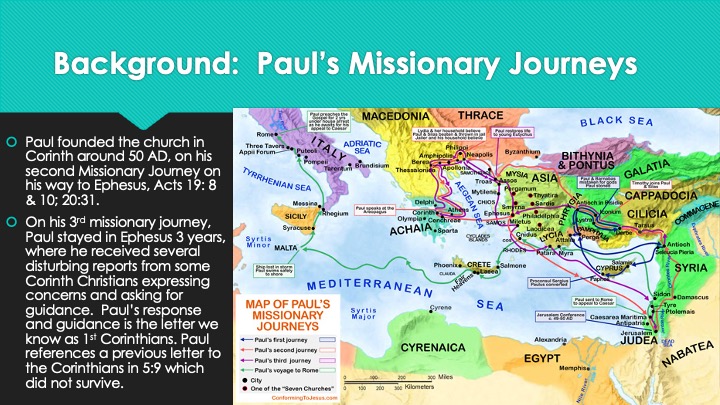
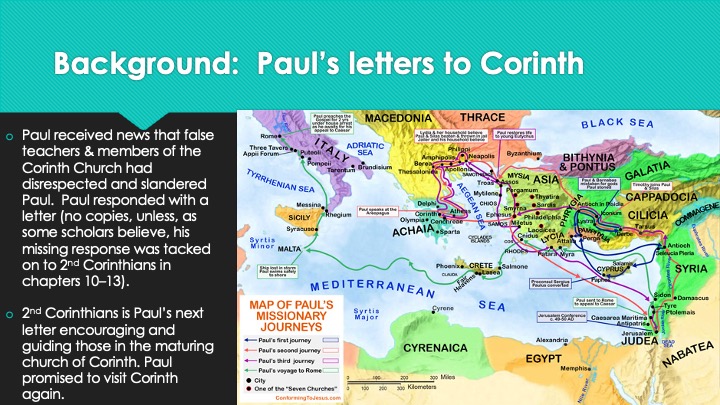
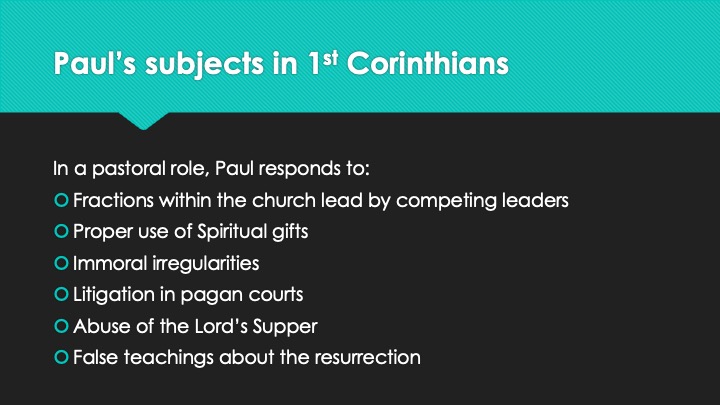
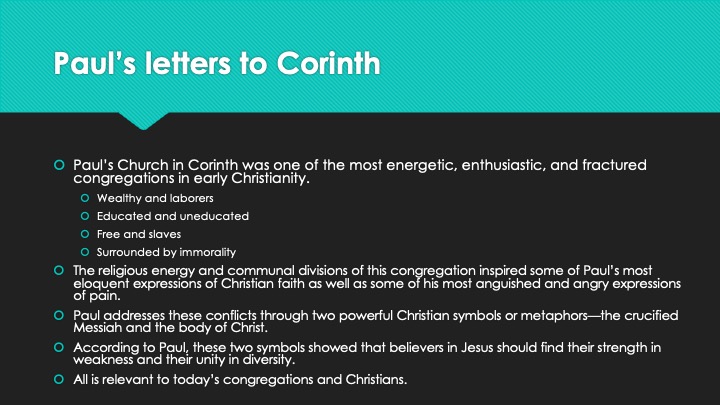
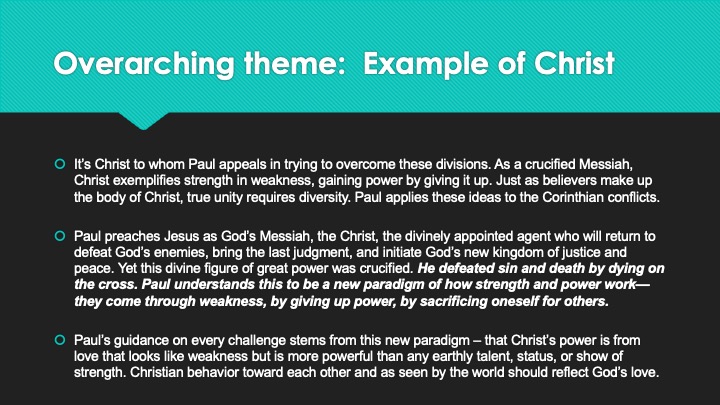
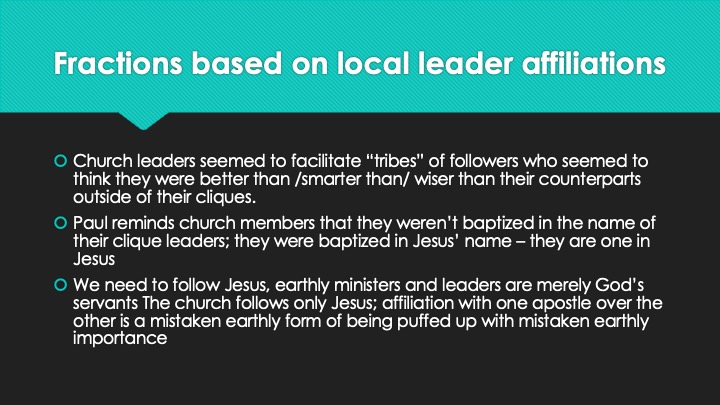
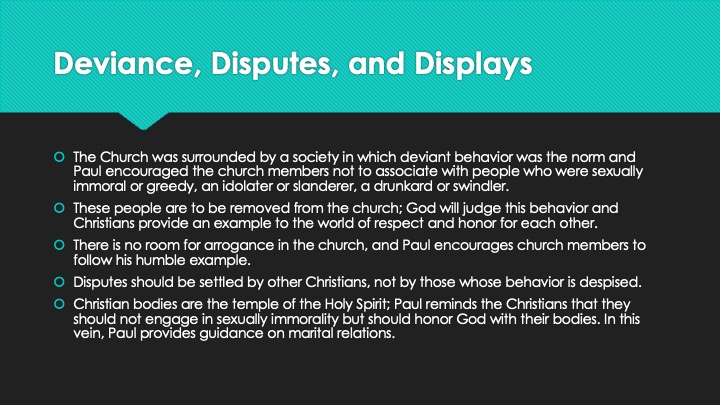
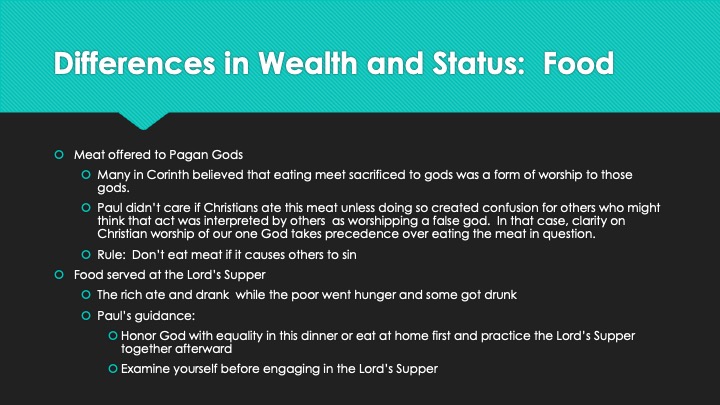
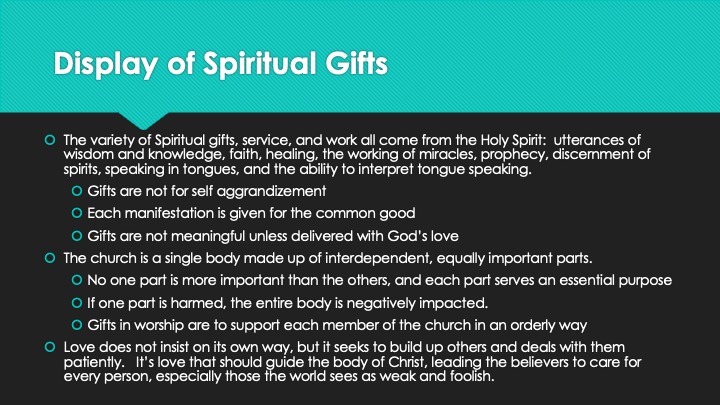
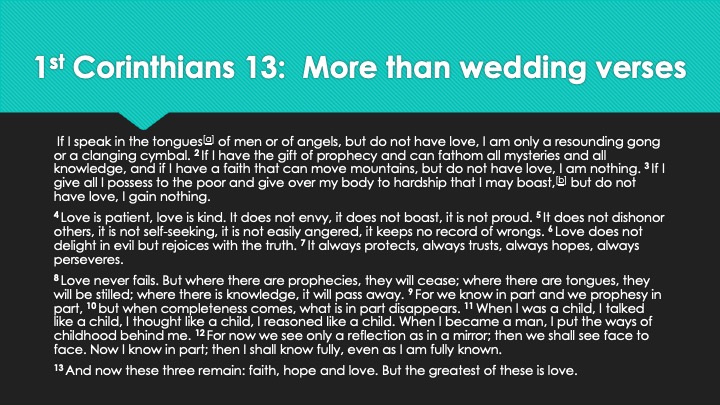
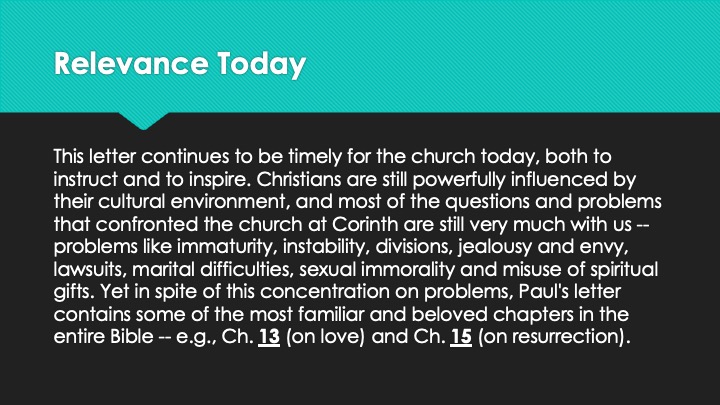
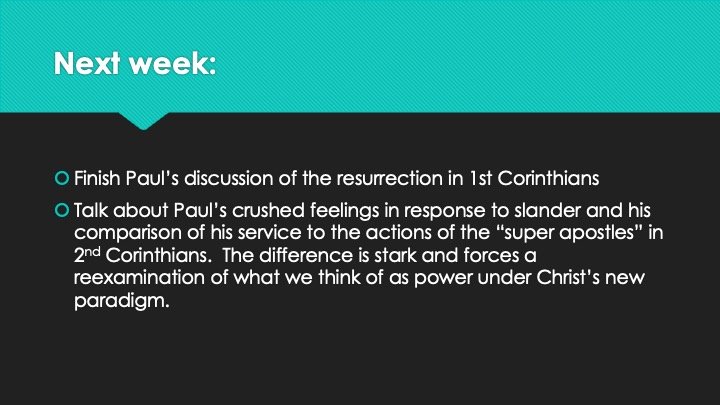
1st
and 2nd Corinthians
A Community in Conflict
Paul’s letters to a struggling infant church formed in the midst of a culture of depravity.
Background: Corinth
o Ancient, thriving City in Achaia, on the Isthmus of Corinth, connecting mainland Greece to the Peloponnese
o At the time of Paul’s first visit, Corinth was the chief commercial and political City in Greece
o Wealthy trade City with stone road carrying small ships and goods across the isthmus between ships in the Ionian sea and the Saronic Gulf
o Idol worship and religious sex were prominent – at one point the temple of Aphrodite was served by 1,000 priestess prostitutes
o Gentiles who valued Greek culture and wisdom
Corinthians A Community in Conflict
Background: Paul’s Missionary Journeys
Paul founded the church in Corinth around 50 AD, on his second Missionary Journey on his way to Ephesus, Acts 19: 8 & 10; 20:31.
On his 3rd missionary journey, Paul stayed in Ephesus 3 years, where he received several disturbing reports from some Corinth Christians expressing concerns and asking for guidance. Paul’s response and guidance is the letter we know as 1st Corinthians. Paul references a previous letter to the Corinthians in 5:9 which did not survive.
Corinthians A Community In Conflict
Background: Paul’s letters to Corinth
o Paul received news that false teachers & members of the Corinth Church had disrespected and slandered Paul. Paul responded with a letter (no copies, unless, as some scholars believe, his missing response was tacked on to 2nd Corinthians in chapters 10–13).
o 2nd Corinthians is Paul’s next letter encouraging and guiding those in the maturing church of Corinth. Paul promised to visit Corinth again.
Corinthians A Community In Conflict
Paul’s Subjects in 1st Corinthians
In a pastoral role, Paul responds to:
o Fractions within the church lead by competing leaders
o Proper use of Spiritual gifts
o Immoral irregularities
o Litigation in pagan courts
o Abuse of the Lord’s Supper
o False teachings about the resurrection
Corinthians A Community In Conflict
Paul’s Letters to Corinth
o Paul’s Church in Corinth was one of the most energetic, enthusiastic, and fractured congregations in early Christianity.
o Wealthy and laborers
o Educated and uneducated
o Free and slaves
o Surrounded by immorality
o The religious energy and communal divisions of this congregation inspired some of Paul’s most eloquent expressions of Christian faith as well as some of his most anguished and angry expressions of pain.
o Paul addresses these conflicts through two powerful Christian symbols or metaphors—the crucified Messiah and the body of Christ.
o According to Paul, these two symbols showed that believers in Jesus should find their strength in weakness and their unity in diversity.
o All is relevant to today’s congregations and Christians.
Corinthians A Community In Conflict
Overarching Theme: Example of Christ
o It’s Christ to whom Paul appeals in trying to overcome these divisions. As a crucified Messiah, Christ exemplifies strength in weakness, gaining power by giving it up. Just as believers make up the body of Christ, true unity requires diversity. Paul applies these ideas to the Corinthian conflicts.
o Paul preaches Jesus as God’s Messiah, the Christ, the divinely appointed agent who will return to defeat God’s enemies, bring the last judgment, and initiate God’s new kingdom of justice and peace. Yet this divine figure of great power was crucified. He defeated sin and death by dying on the cross. Paul understands this to be a new paradigm of how strength and power work—they come through weakness, by giving up power, by sacrificing oneself for others.
o Paul’s guidance on every challenge stems from this new paradigm – that Christ’s power is from love that looks like weakness but is more powerful than any earthly talent, status, or show of strength. Christian behavior toward each other and as seen by the world should reflect God’s love.
Corinthians A Community In Conflict
Fractions Based on Local Leader Affiliations
o Church leaders seemed to facilitate “tribes” of followers who seemed to think they were better than /smarter than/ wiser than their counterparts outside of their cliques.
o Paul reminds church members that they weren’t baptized in the name of their clique leaders; they were baptized in Jesus’ name – they are one in Jesus
o We need to follow Jesus, earthly ministers and leaders are merely God’s servants The church follows only Jesus; affiliation with one apostle over the other is a mistaken earthly form of being puffed up with mistaken earthly importance
Deviance, Disputes, and Displays
o The Church was surrounded by a society in which deviant behavior was the norm and Paul encouraged the church members not to associate with people who were sexually immoral or greedy, an idolater or slanderer, a drunkard or swindler.
o These people are to be removed from the church; God will judge this behavior and Christians provide an example to the world of respect and honor for each other.
o There is no room for arrogance in the church, and Paul encourages church members to follow his humble example.
o Disputes should be settled by other Christians, not by those whose behavior is despised.
o Christian bodies are the temple of the Holy Spirit; Paul reminds the Christians that they should not engage in sexually immorality but should honor God with their bodies. In this vein, Paul provides guidance on marital relations.
Corinthians A Community In Conflict
Differences in Wealth and Status: Food
o Meat offered to Pagan Gods
o Many in Corinth believed that eating meet sacrificed to gods was a form of worship to those gods.
o Paul didn’t care if Christians ate this meat unless doing so created confusion for others who might think that act was interpreted by others as worshipping a false god. In that case, clarity on Christian worship of our one God takes precedence over eating the meat in question.
o Rule: Don’t eat meat if it causes others to sin
o Food served at the Lord’s Supper
o The rich ate and drank while the poor went hunger and some got drunk
o Paul’s guidance:
o Honor God with equality in this dinner or eat at home first and practice the Lord’s Supper together afterward
o Examine yourself before engaging in the Lord’s Supper
Corinthians A Community In Conflict
Display of Spiritual Gifts
o The variety of Spiritual gifts, service, and work all come from the Holy Spirit: utterances of wisdom and knowledge, faith, healing, the working of miracles, prophecy, discernment of spirits, speaking in tongues, and the ability to interpret tongue speaking.
o Gifts are not for self aggrandizement
o Each manifestation is given for the common good
o Gifts are not meaningful unless delivered with God’s love
o The church is a single body made up of interdependent, equally important parts.
o No one part is more important than the others, and each part serves an essential purpose
o If one part is harmed, the entire body is negatively impacted.
o Gifts in worship are to support each member of the church in an orderly way
o Love does not insist on its own way, but it seeks to build up others and deals with them patiently. It’s love that should guide the body of Christ, leading the believers to care for every person, especially those the world sees as weak and foolish.
Corinthians A Community In Conflict
1st Corinthians 13: More Than Wedding Verses
o If I speak in the tongues of men or of angels, but do not have love, I am only a resounding gong or a clanging cymbal. 2 If I have the gift of prophecy and can fathom all mysteries and all knowledge, and if I have a faith that can move mountains, but do not have love, I am nothing. 3 If I give all I possess to the poor and give over my body to hardship that I may boast,[b] but do not have love, I gain nothing.
o 4 Love is patient, love is kind. It does not envy, it does not boast, it is not proud. 5 It does not dishonor others, it is not self-seeking, it is not easily angered, it keeps no record of wrongs. 6 Love does not delight in evil but rejoices with the truth. 7 It always protects, always trusts, always hopes, always perseveres.
o 8 Love never fails. But where there are prophecies, they will cease; where there are tongues, they will be stilled; where there is knowledge, it will pass away. 9 For we know in part and we prophesy in part, 10 but when completeness comes, what is in part disappears. 11 When I was a child, I talked like a child, I thought like a child, I reasoned like a child. When I became a man, I put the ways of childhood behind me. 12 For now we see only a reflection as in a mirror; then we shall see face to face. Now I know in part; then I shall know fully, even as I am fully known.
o 13 And now these three remain: faith, hope and love. But the greatest of these is love.
Corinthians A Community In Conflict
Relevance Today
This letter continues to be timely for the church today, both to instruct and to inspire. Christians are still powerfully influenced by their cultural environment, and most of the questions and problems that confronted the church at Corinth are still very much with us -- problems like immaturity, instability, divisions, jealousy and envy, lawsuits, marital difficulties, sexual immorality and misuse of spiritual gifts. Yet in spite of this concentration on problems, Paul's letter contains some of the most familiar and beloved chapters in the entire Bible -- e.g., Ch. 13 (on love) and Ch. 15 (on resurrection).
Next Week:
o Finish Paul’s discussion of the resurrection in 1st Corinthians
o Talk about Paul’s crushed feelings in response to slander and his comparison of his service to the actions of the “super apostles” in 2nd Corinthians. The difference is stark and forces a reexamination of what we think of as power under Christ’s new paradigm.